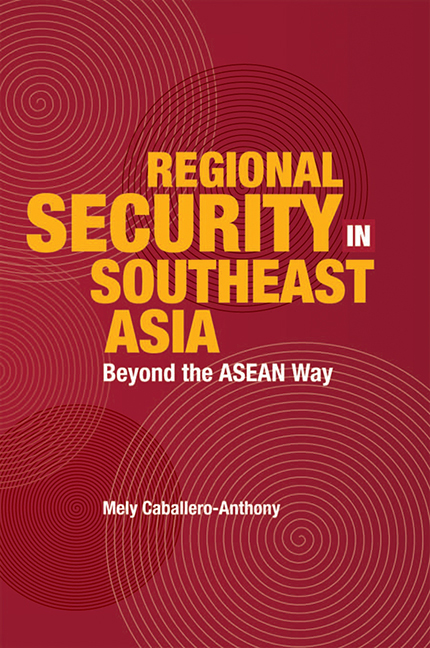Book contents
- Frontmatter
- Contents
- Acknowledgements
- INTRODUCTION: Regional Security in Southeast Asia: Beyond the ASEAN Way
- 1 Regionalism and Regional Security: Locating ASEAN
- 2 ASEAN's Mechanisms of Conflict Management: Revisiting the ASEAN Way
- 3 ASEAN and the Cambodian Conflict: Testing the Limits of the ASEAN Way
- 4 ASEAN Regional Forum: Extending the ASEAN Way in Managing Regional Order
- 5 ASEAN's Track Two Diplomacy: Reconstructing Regional Mechanisms of Conflict Management
- 6 The Asian Economic Crisis and Other Challenges: Turning Points Beyond the Comfort Zone?
- 7 ASEAN and Civil Society: Enhancing Regional Mechanisms for Managing Security
- 8 Conclusion: Beyond the ASEAN Way
- APPENDIX I Declaration of ASEAN Concord II (Bali Concord II)
- APPENDIX II Recommendations of the High-Level Task Force on ASEAN Economic Integration
- APPENDIX III ASEAN Vision 2020
- APPENDIX IV Declaration of ASEAN Concord
- Selected References and Further Readings
- Index
- About the Author
1 - Regionalism and Regional Security: Locating ASEAN
Published online by Cambridge University Press: 21 October 2015
- Frontmatter
- Contents
- Acknowledgements
- INTRODUCTION: Regional Security in Southeast Asia: Beyond the ASEAN Way
- 1 Regionalism and Regional Security: Locating ASEAN
- 2 ASEAN's Mechanisms of Conflict Management: Revisiting the ASEAN Way
- 3 ASEAN and the Cambodian Conflict: Testing the Limits of the ASEAN Way
- 4 ASEAN Regional Forum: Extending the ASEAN Way in Managing Regional Order
- 5 ASEAN's Track Two Diplomacy: Reconstructing Regional Mechanisms of Conflict Management
- 6 The Asian Economic Crisis and Other Challenges: Turning Points Beyond the Comfort Zone?
- 7 ASEAN and Civil Society: Enhancing Regional Mechanisms for Managing Security
- 8 Conclusion: Beyond the ASEAN Way
- APPENDIX I Declaration of ASEAN Concord II (Bali Concord II)
- APPENDIX II Recommendations of the High-Level Task Force on ASEAN Economic Integration
- APPENDIX III ASEAN Vision 2020
- APPENDIX IV Declaration of ASEAN Concord
- Selected References and Further Readings
- Index
- About the Author
Summary
INTRODUCTION
This chapter sets out the framework in examining ASEAN's mechanisms in managing conflicts and relates its experience in the broader study of regionalism and regional security. The first part begins with a brief discussion of regional organizations and their role in managing regional security. This section highlights the experiences of regional organizations, particularly in the developing world in responding to regional crises. It then proceeds to argue that in spite of its chequered history, regional organizations play a significant role in managing and resolving regional conflicts, particularly if one looks at their specific experiences.
The second part of this chapter identifies the kinds of mechanisms that regional organizations develop and deploy in responding to conflicts. In exploring what these mechanisms are, regional security approaches are also examined to establish their linkages with the kind of mechanisms that regional organizations generate. In drawing the linkages between these two elements, the study demonstrates that one informs the other – that is, security approaches influence the nature of mechanisms regional organizations develop.
The third part then proceeds to locate these mechanisms of conflict management within the constructivist school of international relations theory in order to analyse why distinct mechanisms are constructed. Through the prism of social constructivism, this section examines how mechanisms of conflict management have evolved and identifies the kinds of influences that would have informed the choice of certain types of mechanisms that would be applied under given circumstances. A key question that is being asked here is whether norms and identity matter.
The purpose of adopting a three-step approach in this first chapter is to present ASEAN as a regional organization that has actively been engaged in managing the security of Southeast Asia. As the other chapters of this book will show, ASEAN has dealt with regional conflicts in a rather distinctive manner, characterized by the observance of informal mechanisms in managing inter-state disputes.
- Type
- Chapter
- Information
- Regional Security in Southeast AsiaBeyond the ASEAN Way, pp. 14 - 48Publisher: ISEAS–Yusof Ishak InstitutePrint publication year: 2005



